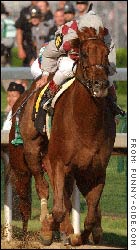NEW YORK (CNN/Money) -
How do you make a small fortune owning thoroughbreds? Start with a large fortune.

That may be the oldest joke in horse racing, but it's true. In fact, it's hard to think of a worse investment than buying a race horse. Just ask Jon Constance.
Constance is a member of the 10-man partnership that owns Funny Cide, the gelding who won both the Kentucky Derby and Preakness Stakes last year, two of the three Triple Crown races.
You might think that landing in the winner's circle at two of the sport's most lucrative events would mean fame and fortune. In Funny Cide's case, there was considerably more of the former than the latter.
"Anybody who gets into this business to make money is a fool," he said. "We were in it to have fun."
Funny Cide's owners began their partnership in 1995 with only six men. They bought their first horse for $30,000 and have owned eight different horses over the years. Funny Cide was their most expensive purchase to date, carrying a $75,000 price tag.
Seventy-five grand may sound like a lot of money, but considering his achievements, Funny Cide was a bargain.

"Race horses of his caliber are generally in the million-dollar category," Constance said. "A relative of his sold for $600,000."
Indeed, horse prices range from $7,500 on the low end to well over a million dollars. Robert Flynn, the executive director of the New York Thoroughbred Horsemen's Association, pegs the mid-range at $25,000 to $50,000.
But buying a horse is only the first of many expenditures. Like you, horses wear shoes, which cost between $50 to $60 a pair and need to be changed every other week.
That's a minor expense compared to $50 to $100 a week for routine vet check-ups and $70 to $100 a day for training fees.
The total bill should come in between $800 and $2,000 a month, according to Constance. Flynn, however, says monthly maintenance costs run closer to $3,000 in the New York metropolitan area.
Run, baby run
The Triple Crown is a trio of high-stakes races with each purse, or total prize money, tallying $1 million. The 130th Kentucky Derby takes place on Saturday at Churchill Downs in Louisville, Ky.
The odds of making it to the Derby -- or to the Preakness or the Belmont Stakes -- are just about as long as odds can be. There are 21,367 registered three year-old starters, according to the Thoroughbred Times. The Derby has a maximum field of 20 horses.
Entering the races is also a costly endeavor. Both the entry and starting fees for the Derby are $15,000, or a total of $30,000. You'll need another $20,000 each to cover the entry and starting fees for both the Preakness and Belmont races.
Kentucky Derby stocks
If your horse places in the top four at the Derby, you'll take home a little something for your effort.
Last year's Derby winner, Funny Cide, took home $800,200 while his nearest challenger, Empire Maker, earned $170,000. An $85,000 prize went to third-place finisher Peace Rules and Atswhatimtalknbout won $45,000 after coming in fourth.
Skim off 10 percent commission fees for both the jockey and the trainer and the rest of the winnings are yours. But if you're not the sole owner, you'll have to split it with your partners.
Constance says he received a check for $40,000 after all the fees were paid, costs were deducted and earnings were divided between each of the investors.
A strong finish in a high-stakes race helps to determine how much a colt garners in stud fees, something that wouldn't apply to Funny Cide.
One horse can mate with 80 to 90 mares a year. With fees ranging from $5,000 to $25,000 for each live foal born, most owners are happy to send their stallions out to get busy.
Even so, only a handful of horses ever make enough to offset their upkeep. But between race earnings and stud fees, some owners are able to recoup just enough to prevent Running with the Wind from becoming Running Away with All My Money.
Owning a racehorse, Flynn says, lets "you go from being a fan and a spectator to being a player." In the end, that may be where the value of racing lies.
"When you go to a barn in the morning and bring your family with you, and your kids see it, it's like a mini-vacation," he said. "For those two minutes, all your problems seem to go away."

|

